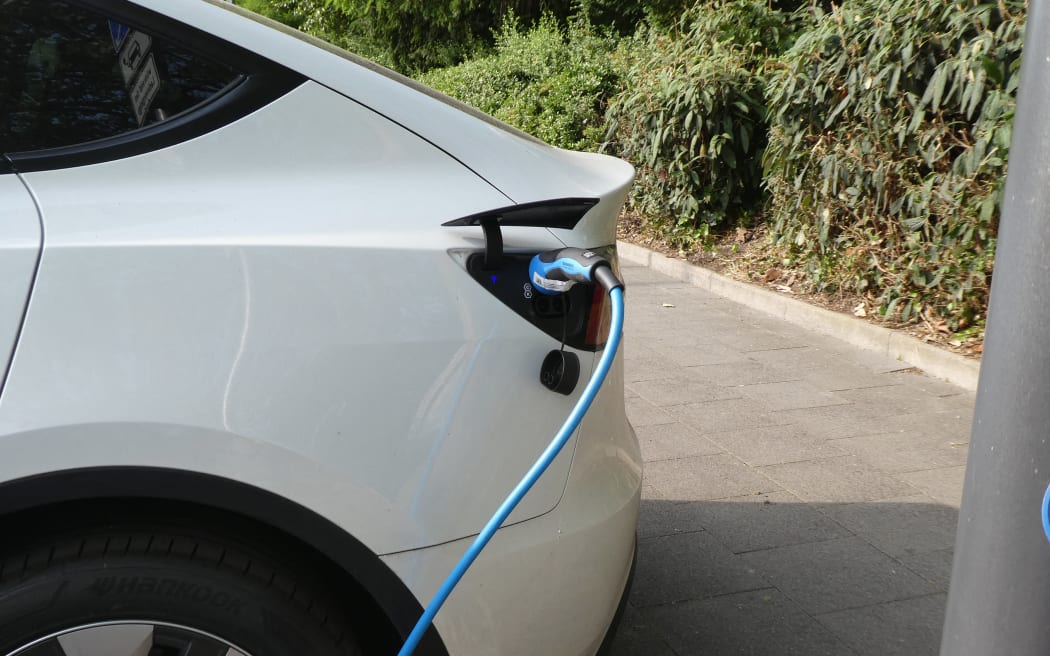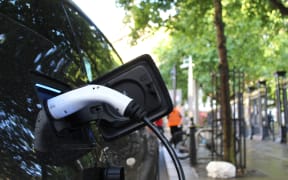
EVs have been exempt from road user charges to encourage people to buy them. Photo: Horst Galuschka / DPA / dpa Picture-Alliance via AFP
Documents show the government expects problems ahead over road user charges (RUC) on electric vehicles (EVs), amid talk of an "e-RUC for electric vehicles".
One predicts growing non-compliance with road user charges and debt for customers entering the system.
Others - released under the Official Information Act - said the road user system as it is could not cope, suggesting strategic changes to road user charges to deal with financial pressures as part of a wide regulatory overhaul of transport.
EVs have been exempt from the charges to encourage people to buy them, but this has eaten into revenue raised at the fuel pump for fixing roads.
"Electric vehicles currently exempted but [are] expected to be added to the system in April 2024," said a May 2023 Waka Kotahi document.
As things stand, that would see owners begin to be charged $76 per 1000km, to add to the $2 billion in RUC raised from other motorists, mostly truckers and diesel car owners.
However, the documents also show officials have been investigating what to do next as they struggle to modernise the whole regulatory system.
"Environmental regulation projects include investigating... low-emission Road User Charges changes, such as e-RUC for electric vehicles," said a Waka Kotahi document last month.
Most of the three documents released by NZTA to RNZ were blanked out, and officials at the Transport Ministry also remained tightlipped about road user charges.
However, a short unredacted part of a May 2023 Waka Kotahi document forecast problems - "an increase of non-compliance and debt for customers entering the RUC system".
"Current resources are set up to manage the existing RUC system," it said. "There will not be enough resource to cope with the increase in education, engagement and enforcement needed."
Another document said a work programme to look at the entire RUC system had been set up to bring together strategy and improvements.
"Key strategic choices about RUC are inherently linked to long-term revenue challenges" including non-compliance and debt management, it said.
Change would have to involve the Ministry of Transport, Treasury and police, it said.
Meanwhile, the Ministry of Transport told RNZ it had done three briefings but refused to release any of them on the grounds that ministers were still considering them.
"Cabinet decisions on their recommendations have not been made," it said on 10 August.
The New Zealand Herald last month quoted a government spokesperson saying changes to the current rules on RUCs were not being considered.
But the big picture is of change afoot, and the pressure rising. The documents showed Waka Kotahi asked its board last month for "high level direction on the desired future state regulatory system and framework, regulatory reform priorities and the approach it would like Waka Kotahi to take in pursuing regulatory framework modernisation".
Cutting emissions had made its job much bigger, it said.
"The Emissions Reduction Plan, National Adaptation Plan, Carbon-Neutral Government Programme and Climate Emergency Response Fund have rapidly altered our policy landscape and significantly expanded the land transport regulatory task.
"The Emissions Reduction Plan is directly driving changes to the land transport regulatory framework", and it went on to immediately mention an e-RUC for EVs.
It was in the middle of rejigging many fees - raising many especially for industry - after the first fees review in decades, to patch a funding shortfall of about $20m a year.
NZTA's costs have been $185m a year, but it said it needed $265m "to strengthen the regulatory function, increase our regulatory activities, address past and future inflation, and for the repayment of loans".
The National Party said it would not extend the exemption for electric light vehicles beyond March 31 next year.
It had aimed for the EV exemption to stay in place till about 2 percent of the national fleet was electric, and that level looked likely to be reached around next April.







